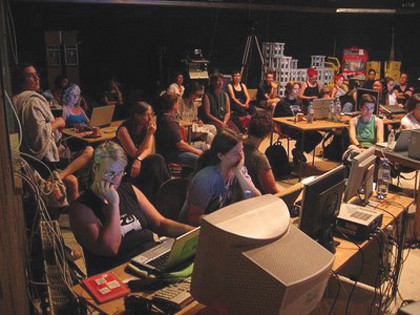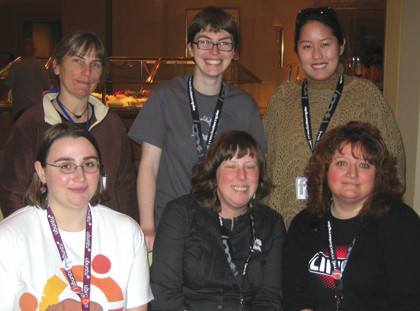Why is open source dominated by men?
Less than 3% of open source producers are women

ECLECTIC TECH: Hackers at the Eclectic Tech Carnival, a mix of debate, art and open tech workshops
Because there are so few women in FLOSS, it's often assumed that there are none. Collaborators have been compiling a comprehensive list of women in FLOSS and a timeline for FLOSS feminism on the GeekFeminism wiki.
One of the highest visibility projects is the Ada Lovelace Day founded in 2009 by Suw Charman- Anderson. Every year women all over the world blog about the technical women they most admire, and in its first year more than 2,000 women blogged about their heroines.
The Ada Initiative was founded by Aurora and Mary Gardiner to increase women's participation in open technology and culture. It aims to provide the information organisations and businesses need to support and encourage more women to contribute. This will include consultancy and workshops but, more importantly, making resources freely available under creative commons licences. The initiative has also been surveying women and men about their perceptions of women in open technology and culture.
Aurora and Gardiner have been working to improve the treatment of women in open source on a voluntary basis for about a decade. They decided to follow the same path that open source did in paying people competitive wages to work on problems that weren't compatible with spare-time volunteer labour.
Aurora believes it's vital that women take more public credit for their open source work and especially their contributions to the Linux kernel. "I thought it was grasping or improper or unladylike to take credit," she said.
"The most common form is doing development internally to a company or project, where one person submits all the code under their name to the mainstream community. This helps no one: it doesn't help you - later on, you will be belittled and ignored because you didn't check in enough code; it doesn't help other women, because no one will be able to point to women's code; and it doesn't help the attempted meritocracy of open source development when people take credit for code that isn't theirs."
Sign up for breaking news, reviews, opinion, top tech deals, and more.
Equal opportunities
The Flossie Network brings together women working to promote the use of FLOSS in digital arts, education, charities, women's groups, activism and campaigning. Flossie is developing events and practical workshops to encourage women to further improve their technical skills, see themselves as 'technical', and become more involved in the FLOSS community.
MzTek is a women's collective working with female digital artists helping them pick up technical skills to use in their work. G.Hack is a supportive and friendly space for women to do hands-on experimental production, fusing art and technology, at Queen Mary, University of London.
Ruth Catlow, of Furtherfield, co-curates P2P Foundation's World of Free and Open Source Art, a collection of artworks, texts and resources about freedom and openness in the arts.
Diversity for all

GAINING TRACTION: The 2011 Ubuntu Women's lunch. Female contributions to Ubuntu are on the rise
Five years on from FLOSSPOLS, there seems little question that the social innovation of FLOSS women's groups can also benefit the wider FLOSS community.
Women's efforts to encourage and support each other have proven very successful not only in making a change - however gradual - to the number of women contributing, but also in raising the profile of FLOSS in the wider world and creating a more approachable and inclusive space for newbies in general. It's surely not only women who could benefit from a bit of a 'welcome wagon'.
Many more FLOSS projects could adopt diversity programmes to aid recruitment, foster inclusivity and make everyone's life easier. Many FLOSS participants, however, see any effort to diversify as 'spoon-feeding' and as somehow 'diluting merit'.
Vittorio Miliano (who is not a woman!) sums it up beautifully in Designers and Women in Open Source: "What you see as spoon-feeding is what normal men and women… see as proper, instructive socialisation: 'Hi, welcome to the community, here's a house-warming present; here's how things work; we could really use some help over here, and I'd love to show you how to work on it; but anything you want to do, feel free and I'll be here to answer any questions'."
Miliano's paper points out that this isn't about mollycoddling but about creating a more pleasant, social and comfortable environment for everyone. It's not enough to think of FLOSS as a meritocracy and ascribe 'failure' to those left 'outside'.
FLOSS will never grow and achieve popular acceptance by perpetuating an insular attitude. So why not agree a diversity statement or a code of conduct for your project and make sure people are genuinely committed to it?
Be aware that women and men may have different sensitivities - try to remember that men would probably not find belittling remarks and trivialisation of their concerns funny either. Feminism doesn't mean women are always right, it just provides an opportunity to become more aware and exchange opinions respectfully.
Take the time to help new people 'settle in'. Be aware that women often have additional demands on their time and fewer resources. Do meetings always have to be at 9pm and/or in pubs, for example?
When organising programmes and events, check that you are creating a women-friendly environment and also consider what additional resources women might need in order to be able to attend volunteer events and programmes. If few women are getting involved, reach out and take steps to make women feel welcome - and if you happen to be male, just try to think how you'd feel alone in a room full of intimidatingly knowledgeable women and do as you would be done by.
Women aren't asking for special treatment - quite the opposite! Most men in FLOSS want more women involved, and more women want to participate. Since FLOSSPOLS, the percentage of women in FLOSS overall has grown to 3% and can be as high as 75% if women are explicitly welcomed.
A new-found confidence in confronting the issue has led to a growing consensus that alienating women is not in the best interests of the wider movement. Creating a welcoming atmosphere makes being part of FLOSS better for everyone.